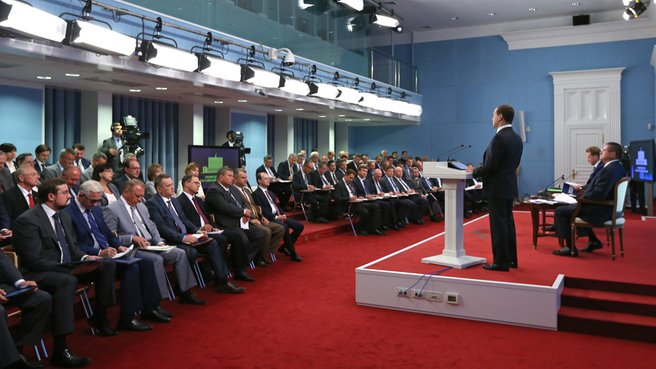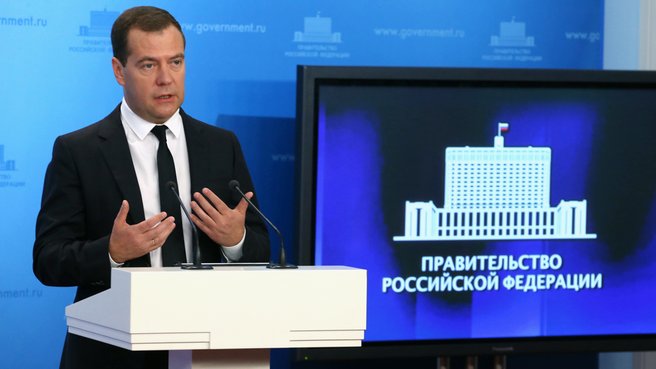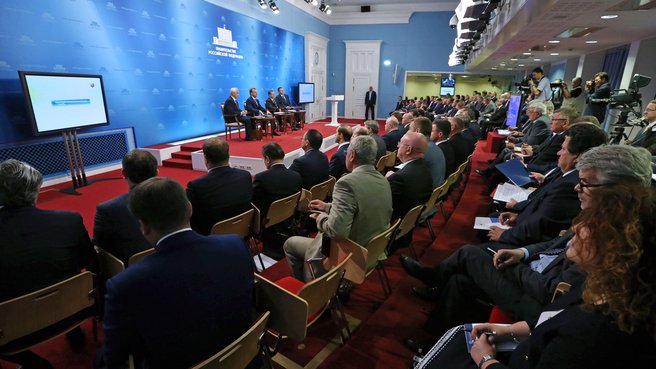Dmitry Medvedev: "On the basis of EXIAR (Export Insurance Agency of Russia) and Roseximbank (Eximbank of Russia), we are creating an integrated institute of credit and insurance support for exports: an agency that will offer its clients everything they need for efficient work and relevant insurance and loan products."
From the speech at the meeting:
Dmitry Medvedev: The world economy is emerging from the crisis. All countries, including our partners, are searching for any opportunities of economic recovery and consolidation of their positions on the world market. We are witnessing the growth of protectionism, which is affecting the positions of our producers, our commodities and our companies. In all likelihood, this trend will not subside.
Such is the modern global economy, and we must all learn to work in this environment, all the more so, as it is changing all the time. We must display initiative and know what our rivals and potential partners are doing. We must be able to predict the potential influence of political factors and build cooperation accordingly with Russian and local businesses, bilateral business councils and, naturally, embassies. Trade missions can do a lot in this respect.
Dmitry Medvedev: "The world economy is emerging from the crisis. All countries, including our partners, are searching for any opportunities of economic recovery and consolidation of their positions on the world market. We are witnessing the growth of protectionism, which is affecting the positions of our producers, our commodities and our companies."
What are the main tasks today?
First, it is necessary to increase industrial exports. All over the world, non-primary exports are a major catalyst of economic growth owing to their high added value. Is it no accident that they amount to almost 85 percent of all global exports, and their value exceeds $15 trillion.
Russia is lagging far behind other industrialised countries in the commodity structure of its exports. Raw materials still account for about half of them. In the past year or year and a half, supplies of non-resource products have grown faster than exports in general, which is a good thing. However, our contribution to world trade in manufactured goods remains very small: about 1.5 percent. Needless to say, we cannot accept this.
We must develop a balanced, logical and efficient system of supporting industrial exports, provide for clear-cut distribution of tasks and responsibilities and exceed the rate of development of world trade in non-primary exports. Our growth rate should be no less than six percent per year.
Our task is to change the structure of Russian exports in the countries where you work. We must increase the share of machines and equipment and other high-tech and science-intensive products.
Dmitry Medvedev: "On the basis of EXIAR (Export Insurance Agency of Russia) and Roseximbank (Eximbank of Russia), we are creating an integrated institute of credit and insurance support for exports: an agency that will offer its clients everything they need for efficient work and relevant insurance and loan products."
We must increase the number of exporters by involving regional companies as well as medium and small businesses, to which we did not pay much attention in the past and which are not well known on the export market. Big business takes care of its interests, and often without the state’s involvement, whereas for relatively small companies, finding a reliable partner or insuring against risks is still a huge problem. It is necessary to involve financial support institutes, use all opportunities for getting loans on location, in the country of stay, and take advantage of diplomatic and administrative resources. This is exactly how our rivals operate all over the world.
In this context, I’d like to mention that, on the basis of EXIAR (Export Insurance Agency of Russia) and Roseximbank (Eximbank of Russia), we are creating an integrated institute of credit and insurance support for exports: an agency that will offer its clients everything they need for efficient work and relevant insurance and loan products. Many of them are being worked out taking into account the requirements of small and medium-sized companies.
Second – protecting the interests of Russian companies.
Any and all instances of discrimination against Russian companies must be identified, and as much as possible, predicted. Our legitimate interests must be firmly protected, and our responses and reasons for them must be properly explained.
We cannot tolerate anyone supporting their economies at our expense or to our detriment, or – which also happens today – introducing protectionist measures in the interest of specific companies under the guise of sanctions. And this is happening in violation of WTO commitments.
Just like any other WTO member, Russia is entitled to use the WTO mechanisms to protect its interests. All the more so, as the road to WTO membership was rocky for us. We must learn to use this right in full. Frankly, so far, we haven’t mastered this tool properly.
Third, our work with foreign investors is in need of serious upgrading. Russia is interested in long-term and high-value investments and projects that involve transferring innovative technology and creating modern and effective production facilities. Investors find joint projects with the participation of the state, development institutions and major Russian companies more attractive than simply relying on unilateral funding. We understand this and are willing to provide such conditions to our prospective partners.
Most foreign direct investment in our economy is still concentrated in Moscow and St Petersburg. Investors' attention is limited to these two major Russian cities, largely because of a lack of knowledge on their part about the possibilities that exist in other, no less promising Russian regions, and thus they cannot properly assess their potential. It is imperative that we show investors this potential and these advantages.
Dmitry Medvedev: "Our work with foreign investors is in need of serious upgrading. Russia is interested in long-term and high-value investments and projects that involve transferring innovative technology and creating modern and effective production facilities."
There must be more information about what is being done in our country to improve the business climate. For example, regarding the development of difficult-to-access hydrocarbon fields: taxation and customs terms, and conditions for projects located on the Russian continental shelf are among the best in the world, but we don’t talk enough about it.
Major tax breaks have been provided for priority investment projects in the Russian Far East. In conjunction with the trade missions, the regions of the Russian Far East should put together a package of regional projects for the benefit of prospective investors from Asian countries. Relations with the Asia-Pacific region are key to us. Today, we are in need of a breakthrough in this area, which will help overcome many technical and economic constraints that stand in the way of Russia’s sustainable growth.
Foreign companies can also take advantage of the common market that comprises Russia, Belarus and Kazakhstan. Beginning in 2015, when the Eurasian Economic Union will be formed, there will be free movement of goods, services, capital and labour. From a business perspective, this economic space with common rules and standards can lead to a significant reduction in the costs of doing business. When they start a business in Russia, investors can use the competitive advantages offered by any of these three countries.
Large regional markets, joint investment funds, and broad-based development institutions are the best defence against global economic crises. Everyone in the world is becoming increasingly aware of this with each passing year. We shouldn’t neglect this opportunity to obtain extra insurance for our economy.
The fast-evolving cooperation within BRICS is a case in point.
Dmitry Medvedev: "In conjunction with the trade missions, the regions of the Russian Far East should put together a package of regional projects for the benefit of prospective investors from Asian countries. Relations with the Asia-Pacific region are key to us."
Together with our partners from Belarus and Kazakhstan, we are ready to expand the Customs Union, and to establish free trade areas, including in the “free trade plus” format with individual states and regional associations, including Europe.
Of course, the Ukrainian crisis has complicated our relations with the EU. Occasionally, these events are referred to as a watershed between the past and the future of Europe. This is not how we see it in Russia, and we will keep our focus on mutually beneficial cooperation. The European Union will continue to be our main trading partner for a long time. A substantial portion of energy is supplied to Europe from Russia, and we cherish our reputation as a reliable supplier. But we must be sure that our economic interests are being properly upheld. I’m saying this also because Moldova and Ukraine – countries that are part of the CIS free trade zone agreement – have also signed association agreements with the EU.
We are objectively assessing the negative impact of such decisions for our economy. We believe that these risks are quite significant, especially with regard to technical regulations, standards, as well as sanitary and phytosanitary measures. That is why we are holding consultations with the European Union, our Customs Union and our CIS partners, because at some point we will be forced to introduce protection measures.
Dmitry Medvedev: "Together with our partners from Belarus and Kazakhstan, we are ready to expand the Customs Union, and to establish free trade areas, including in the “free trade plus” format with individual states and regional associations, including Europe."
We are determined to be actively present on different markets (I would like to point this out once again) and work with anyone who is willing to work with us based on equality and mutual benefit. But for objective reasons (I would also like to underscore this point), Latin America and Africa, along with the Asia-Pacific region, are the most promising investment cooperation regions for us now. These regions also have the target audience for increased supplies of Russian equipment, aircraft and other industrial goods.
<…>















